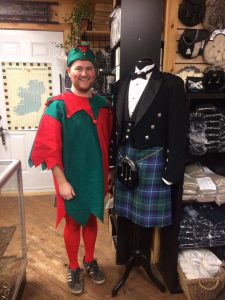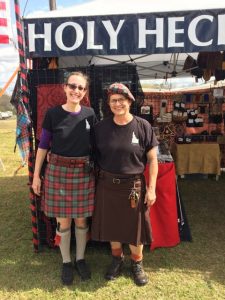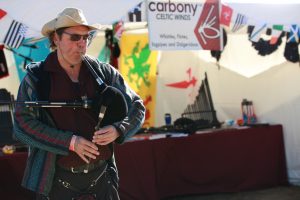
It is festival season, and one of the best things about any festival – from rock hullabaloos to comic-cons – is the swag. Highland Games and Celtic Festivals are no different; vendors come from far and wide to peddle their wares, giving attendees a chance to take home something special to remember the celebration of their heritage.
Vending on the festival circuit is not for the faint of heart, though. It takes dedication, perseverance, and a little luck to be successful.
“Going into an event, you are sinking in a lot of money,” says Carol Ann MacLeod, who co-founded MacLeod Highland Outfitters with her husband Kevin in 2008. “You don’t know how the numbers are going to all add up until the end of the day.”
MacLeod Highland Outfitters was conceived to provide pipe bands in Atlantic Canada with gear and supplies, a strong niche market that wasn’t being serviced. Their catalogue has since expanded to include all sorts of Celtic clothing, giftware, jewelry, highland dance supplies, and more.
“With resources like Ancestry.ca now available, people have really become interested in their heritage. Visitors at Highland Games and Celtic Festivals started to jump in on it, looking for all sorts of items.”
 The couple’s company began as an online shop, and via in-person presence at Celtic events in Eastern Canada. They now have a shop in Moncton, New Brunswick.
The couple’s company began as an online shop, and via in-person presence at Celtic events in Eastern Canada. They now have a shop in Moncton, New Brunswick.
While festival business is good, McLeod admits that there are some challenges to the vocation.
“A seasonal business can be precarious at times. There is always a risk – really, you don’t know what people are going to buy, you can only speculate. You simply do your very best to offer a strong variety of goods.”
In addition, with outdoor events, you are always at the mercy of the clouds.
“You can have a good year or bad year based on weather. You are relying solely on the weather, and spectators. Are people going to show up to an event in the pouring rain?”
MacLeod has seen floods – and even a tornado – undo a lot of hard work.
“There were a lot of vendors that lost everything that day – their tents were ripped away, and their stock was gone. That was brutal. And it is not as if you are really insured against Mother Nature.”
“It is a bit like farming – you plan for it, budget for it, ride the wave, and next time around, hopefully, you have a good season.”
In addition to natural hazards, McLeod notes that the sheer amount of time and energy dedicated to growing the business can be quite taxing.
“Your summers are gone; you are not lounging on a beach on weekends – every weekend you are on the road. During the week, you are placing, receiving and shipping orders.”
It can get even more hectic when weekend work isn’t your only source of income, which is the case for many vendors on the circuit.
“I run another business, and I have a full-time job,” says Roger Scott, founder of Scotsman Grooming. “The challenge that we have is juggling all of that.”
“I usually do between 25 and 30 festivals a year,” adds Rob Gandara, owner of Carbony Celtic Winds out of Corvallis, Oregon. Gandara is a product development engineer by trade, and travels the circuit selling Celtic wind instruments that he makes out of carbon fibre. “And those events are on weekends, so do the math on my work week.”

Despite the hectic schedule, and the inherent risks that come with the gig, these entrepreneurs are quick to credit the festival circuit with the success they have enjoyed; it allows them to connect with customers and spread awareness of their brands in a way that brick-and-mortar and online storefronts cannot.
Holy Heck USA is a Celtic leather craft company based in Boise, Idaho. Founded and co-operated by long-time leather artisans Holly Gilchrist and Selina Heck, the company prides itself on using American cow hide to make their leather products, rather than importing it.
They believe the best way to convince their clientele that this makes a difference in quality is to put it directly in the customer’s hands.
“Our product is so tactile,” says Gilchrist. “The beautiful photos that we have online can give one a sense of the quality of the product, but when you see it in person, it is a whole other level; the smell of the leather – people love that when they visit our vendor booth.”
“Getting out to these events is an integral part of our business,” adds Heck. “It is critical to our business in a way that it keeps the craft alive and vibrant. We don’t want to be artists that work in a vacuum.”
“A hundred years ago, you would have found a bottle of beard conditioner or beard oil to be as common as toothpaste on a Victorian bathroom shelf,” says Roger Scott, whose self-formulated products are naturally-scented and fast-drying.
Beard grooming techniques have fallen out of fashion, according to Scott, and existing products have turned men in-the-know off the practice. Convincing customers his brews are different requires sampling.
“Once they try mine, and they can see the difference, we have about a 98 per cent sales rate.”
Likewise, Rob Gandara’s carbon fibre instruments – which are designed to preserve the resonant integrity of classical 19th-century designs without risk of environmental damage, such as warping or cracking – need to be handled to be appreciated.
“You can build a website and create a great product, but you can’t sit at home and wait – you’ve got to get the items in people’s hands.”
 “This business, probably more than any other, is about relationships,” adds Gandara. “I can’t imagine I ever would have gotten even close to where I am today if I didn’t travel to come to people and meet them.”
“This business, probably more than any other, is about relationships,” adds Gandara. “I can’t imagine I ever would have gotten even close to where I am today if I didn’t travel to come to people and meet them.”
Scott echoes the sentiment, adding that attendees at Celtic festivals are plugged into their heritage, and look for the feeling of a close-knit Scottish village, where vendors play the role of the local shop-keep.
“A Scottish gathering is just that. It is called a gathering for a reason; everyone should feel like they are family when they come, and they are seeing family again whenever they see us.”
That fellowship and familiarity helps to draw Scott and his peers back year after year.
“It is a gathering not only for the attendees, but also for the vendors. What is great is that they come running over as you are setting up on Friday for a hug and a hello. We work in a very collaborative manner.”
“It is much less competitive than maybe one might think,” says Carol Ann MacLeod, who sees vendors aiding each other in times of need. “If you are having some problems or issues, the other vendors are always there with a helping hand.”
“The camaraderie among vendors is exceptional,” says Gandara. “I always feel like I am going home every time I land somewhere, and it is the people that make me feel at home.”




















Leave a Comment